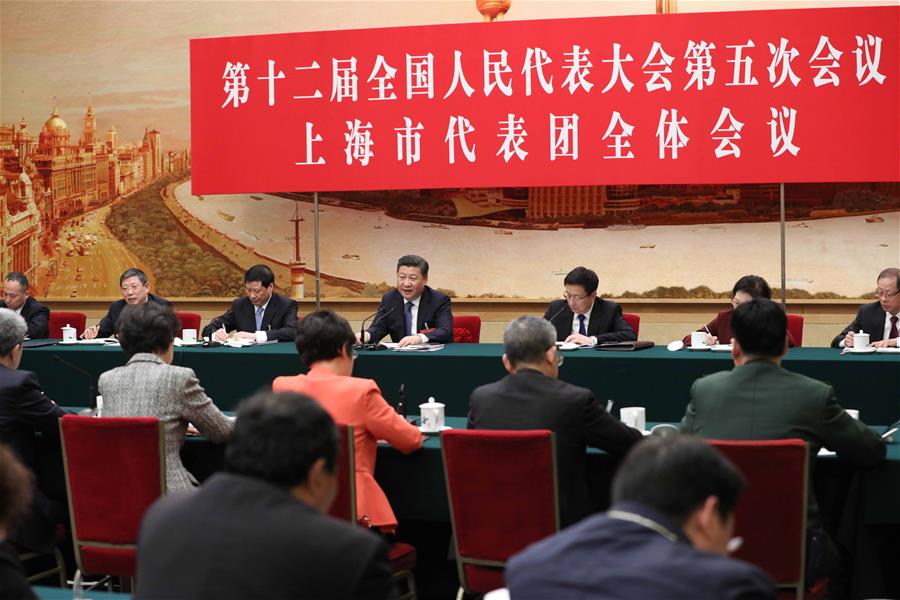BEIJING, March 12 (Xinhua) -- Unveiling unprecedented opening-up measures, China is poised to open its door wider to the world amid a growing tide of protectionism and anti-globalization sentiments.

Chinese President Xi Jinping joins a panel discussion with deputies to the 12th National People's Congress (NPC) from Shanghai Municipality at the annual session of the NPC in Beijing, capital of China, March 5, 2017. (Xinhua/Wang Ye)
Chinese leaders have told national lawmakers during the major annual political sessions that the country will open up like never before.
This once again manifests China's steadfast determination to stick to its reform and opening-up policy as well as China's confidence and strong sense of responsibility in face of rising global uncertainties.
TO OPEN DOOR EVEN WIDER
"Opening-up" is one of the most used catch phrases during China's ongoing "two sessions" -- the annual gatherings of the country's top legislature and the political advisory body.
"China's open door will not close," said President Xi Jinping during the annual two sessions, vowing the country will keep on opening up on all fronts, and continue to liberalize and facilitate trade and investment.
Xi's remarks echoed his January speech at the World Economic Forum in Davos, Switzerland, in which the Chinese president said pursuing protectionism is like "locking oneself in a dark room."
Meanwhile, Xi's pledges sent once again clear messages that China has always been ready to carry out win-win cooperation with other countries.
"At a time when isolationism and protectionism are on the rise in the West, China's openness will be the benchmark for continued globalization," said lawmaker Ou Chengzhong.
China's government work report delivered by Premier Li Keqiang during the two sessions pointed the way to improving the strategic blueprint of China's opening up, and set the course toward a deeper and higher level of opening up.
China will push ahead with the Belt and Road Initiative, for example, by accelerating the building of overland economic corridors and maritime cooperation hubs, and deepening international industrial capacity cooperation, according to the report.
China will also make big moves to improve the environment for foreign investors, including making service industries, manufacturing, and mining more open to foreign investment, encouraging foreign-invested firms to be listed and issue bonds in China, and allowing them to take part in national science and technology projects, the report said.
The latest opening-up initiatives demonstrate China's confidence and focus, said Zhang Zhao'an, deputy head of the Shanghai Academy of Social Sciences and a National People's Congress (NPC) deputy.
Marcelo Fernandez, an international relations analyst, said that given its global geopolitical importance, China's increasing openness is positive.
"It is highly positive that China will open itself further to the world. It is something Ecuadorians must learn to promote our development," said Fernandez, who is also a former diplomat.
REFORM, OPENING-UP MUTUALLY REINFORCED
By sticking to the policy of opening up, China made a choice that greatly benefits its own economic growth as well as the rest of the world.
Experts believe China's resolve to open up wider to the outside world will create a new impetus and bring fresh air to its reform efforts, and as a result, will eventually boost its socio-economic development and improve the livelihood of its people.
"Stimulating the internal impetus to growth through promoting opening up is an important approach to deepening structural reforms," said Du Benwei, a deputy of the NPC, the country's legislature.
"Opening up and reform are actually like two wings of a bird or two wheels of a bicycle, they can interact, promote and reinforce each other," Du said.
The government report said the supply-side structural reform will be given priority in the country's development, and reform efforts will center on a variety of areas, including streamlining administration, reducing taxes, further expanding market access, and reducing the ineffective supply while expanding the effective supply.
"China's endeavors to deepen reforms, improve government efficiency and encourage innovation and entrepreneurship have had positive impacts on the economic sector," Zhang said.
"In coming months, we are going to see a China with enormous dynamism," said Ignacio Martinez Cortes, a professor at the Center for International Relations at the National Autonomous University of Mexico (UNAM).
Those measures and the 6.5-percent economic growth target set for 2017 "aim for sustainable development," Martinez told Xinhua in a recent interview.
Meanwhile, China's opening-up endeavors are generating positive spillovers for the entire world. In today's highly interconnected global economy, China's opening-up policy has helped solidify its role as a key engine for global growth.
China's economic performance contributed more than 30 percent of global economic growth, placing the country ahead of many others.
Its non-financial outbound direct investment increased 44.1 percent year-on-year to 170.11 billion U.S. dollars in 2016, and Chinese companies invested in 7,961 overseas enterprises in 164 countries and regions in the past year, according to the Ministry of Commerce.
China's economy would continue to be the growth engine and stabilizer of the world economy, said Bambang Suryono, an Indonesian scholar and president of the Jakarta-based think tank Nanyang ASEAN Foundation.















